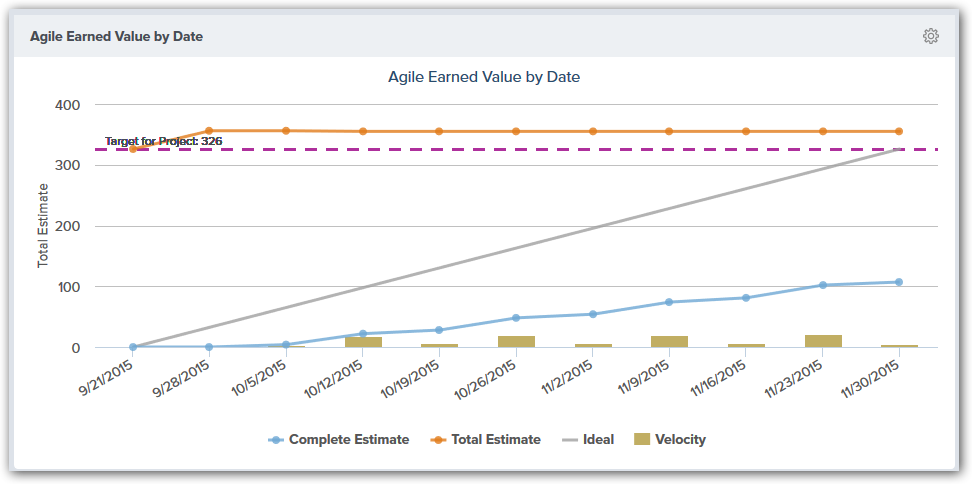Agile Earned Value by Date Dashboard Panel
The Analytics Agile Earned Value by Date dashboard panel enables the comparison of targeted, or baselined, work in a project to what is actually planned and what has been delivered over time. The chart also includes a bar graph indicating the velocity, or how much work was delivered, in each period. Use the Agile Earned Value by Date panel as an agile environment alternative to traditional Earned Value reporting.

Where to Find This Panel
This panel is available on any of the following Analytics dashboards:
- Portfolio > Executive Dashboard
- Program > Dashboard
- Team > Team Dashboard
- Team > Quality Dashboard
- Team > ScrumMaster Dashboard
If the panel is not visible, you can add it following the instructions in Adding a Panel to a Dashboard.
Panel Measures
- Target for Project. The Target, or baselined, total for the selected project. This value is set in the panel parameters, but defaults to the value set in the Target Estimate field for the selected project. If that value is not specified, the default is the total estimate on the first day of the project.
- Complete. This line indicates the total amount of project work completed at the end of each period.
- Total. This line indicate the total amount of work defined in the project on the first day of the project and at the end of each period.
- Ideal. This line indicates how much work would need to be delivered in each period in order to deliver the target estimate in the specified number of periods.
- Velocity. This bar represents the total amount of work completed in each period.
The units for each of these is the same and is based on the aggregation type selected in the panel parameters.
Configuring the Panel
- Click on the gear icon
at the top-right corner of the dashboard panel and click Edit.
- Choose from the panel parameters below.
Parameters for this panel may differ depending on the location of the dashboard.
Panel Parameter Descriptions
- Portfolio Item: Shows work items in the selected portfolio item and all of it's children. The default option is "Blank" and shows all work items.
- Team: Shows Team-specific data for the project or program. The default value is "All" or "Blank".
- Backlog Group: Shows work items in the selected backlog group. The default option is "All".
- Backlog Goal or Objective: Shows work items assigned to the selected backlog goal. The default option is "All".
- Workitem: Shows data for a specific work item type: All (all workitems), Backlog Items, Defects, or Testsets. The default option is "All".
- Target: The amount of work items expected for delivery (also called the Baseline value). The number must be in specified in the units used by the aggregation type. The default value is the value in the Target Estimate attribute on the Project. If blank, the default value is the total estimate in the project on the Start Date.
- Start Date: The first date the report begins calculating data.
- For project-based reports, the default start date is the project start date.
- For sprint or iteration-based reports, the default start date is the sprint or iteration start date.
- For member-based reports, the default start date is 13 weeks prior to the current date.
- If the start date is set to the current date or later, no data displays.
- Sprint or Iteration: Shows data assigned to the sprint or iteration. The default value is "All".
- Duration Size: The number of Duration Units until the project ends. If the project has an end date, the Duration Size defaults to the difference between the Start and End Dates in weeks. If the project has no End Date, the Duration Size defaults to the difference between the Start Date and the current date. Duration Size is set to 0 if the calculation results in a negative number.
- Duration Units: Determines how a period is defined in terms of weeks (default) or months.
- Group By: Shows results grouped by Type, Source, Priority (Default), or Status.
- Defect State: Shows defects in any of the following Reporting Category states: All, Not Started, In Progress, Complete, or Not Complete.
- Aggregation Type: Determines how the data is aggregated. Valid values are:
- Total Estimate - Sum the Estimate values.
- Workitem Count - Count of work items regardless of estimate value.
- Sprint or Iteration Count: Displays the total number of sprints or iterations where work is assigned.